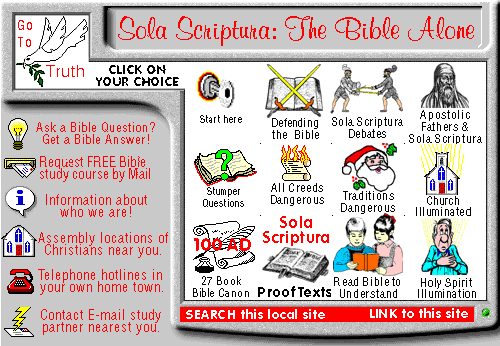Sola Scriptura: The Bible alone is enough!
Apostolic Fathers used scripture as the primary defense against false doctrine.
 Apostolic Fathers: Dates they lived and other information.
Apostolic Fathers: Dates they lived and other information.
 Apostolic Fathers: Five kinds of Tradition.
Apostolic Fathers: Five kinds of Tradition.
200 AD: Hippolytus:
"There is, brethren, one God, the knowledge of whom we gain from the Holy Scriptures, and from no other source. For just as a man, if he wishes to be skilled in the wisdom of this world, will find himself unable to get at it in any other way than by mastering the dogmas of philosophers, so all of us who wish to practice piety will be unable to learn its practice from any other quarter than the oracles of God. Whatever things, then, the Holy Scripture declare, at these let us look; and whatsoever things they teach, these let us learn; and as the Father wills our belief to be, let us believe; and as He wills the Son to be glorified, let us glorify Him; and as He wills the Holy Spirit to be bestowed, let us receive Him. Not according to our own will, nor according to our own mind, nor yet as using violently those things which are given by God, but even as He has chosen to teach them by the Holy Scriptures, so let us discern them." (Hippolytus, Against Noetus, ch 9)

This is a powerful contradiction and refutation to the modern Roman Catholic and Orthodox view of tradition. Although Hippolytus was fully aware that the gospel was first preached 100% orally through the apostles and prophets even before the first book of the New Testament was written, in 200 AD, he recognized that scripture was the only source of authority. This also proves that although Hippolytus may also have recognized the witness of church tradition, he saw that tradition was ultimately derived from scripture, since none of the inspired apostles were alive to consult with.
And certain other (heretics), contentious by nature, (and) wholly uniformed as regards knowledge, as well as in their manner more (than usually) quarrelsome, combine (in maintaining) that Easter should be kept on the fourteenth day of the first month, according to the commandment of the law, on whatever day (of the week) it should occur. (But in this) they only regard what has been written in the law, that he will be accursed who does not so keep (the commandment) as it is enjoined. They do not, however, attend to this (fact), that the legal enactment was made for Jews, who in times to come should kill the real Passover. And this (paschal sacrifice, in its efficacy,) has spread unto the Gentiles, and is discerned by faith, and not now observed in letter (merely). They attend to this one commandment, and do not look unto what has been spoken by the apostle: "For I testify to every man that is circumcised, that he is a debtor to keep the whole law." In other respects, however, these consent to all the traditions delivered to the Church by the Apostles. (Hippolytus. Refutation of All Heresies, book 8, ch 11, The Quartodecimans).

The Quartodecimans (14th Day Christians: Nissan 14 & Easter controversies) calculated the date for Passover according to the Law of Moses. Hippolytus was the bishop of Rome and for reasons unknown, came up with an entirely new way of calculating the date for Passover. (Easter) What is so important about this example, is that Hippolytus labeled these men Quartodecimans and called them heretics. Yet the Quartodecimans wanted to "do it the way the Bible says" and maintain the 1700 year old Jewish tradition of calculating Passover on Nissan 14. But the Jewish calculation meant that Passover (Easter) fell on different days of the week and the church at Rome didn't like this and wanted Easter to always fall on a Sunday. So, contrary to scripture and tradition, they eventually outlawed Quartodeciman view with the Nicene creed. Hippolytus implies that the Quartodecimans keep all other "apostolic tradition", except for rejecting how to properly calculate Easter. Now the "Easter controversy" is an example of how man-made doctrine began to infiltrate the church which no one in the first century practiced. Yearly Easter celebrations are found neither in scripture or the apostolic fathers. What we do find in the apostolic fathers, was that every Sunday was a celebration of the resurrection of Christ. "We keep the eighth day [Sunday] with joyfulness, the day also on which Jesus rose again from the dead" (The Epistle of Barnabas, 100-130 AD, ch 15). So here we have the bishop of Rome, going against both scripture and tradition of the early church. The issue has never been settled because Easter is a man-made holy day. Had scripture revealed it, we would know exactly how to celebrate it. Christ did not tell Christians to remember his birth at Christmas, but his death... and not once a year at Easter, but every Lord's Day, through communion. "Easter", therefore in the early church was a weekly event! Cyprian in 250 AD, says of the Easter controversy: "they who are at Rome do not observe those things in all cases which are handed down from the beginning, and vainly pretend the authority of the apostles" (Cyprian, Epistle 74, 6) This is very bad news for the Roman Catholics who claim unbroken apostolic authority back to the first century!
by Steve Rudd

Go To Start: WWW.BIBLE.CA

![]() Apostolic Fathers: Dates they lived and other information.
Apostolic Fathers: Dates they lived and other information.![]() Apostolic Fathers: Five kinds of Tradition.
Apostolic Fathers: Five kinds of Tradition.